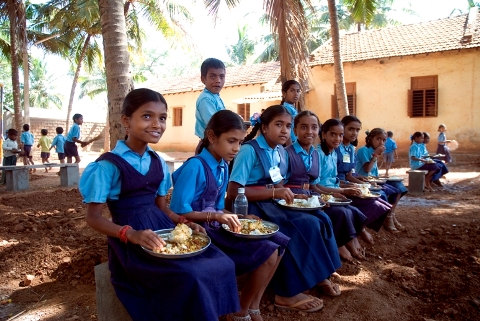
By ICTpost Media Action Bureau
Lack of accurate and timely information has always plagued the MIS of large scale government operations. Cloud Telephony and IVRS (Interactive Voice Response System) based Daily Monitoring System (DMS) has been devised by Mid Day Meal Authority, in Indian state Uttar Pradesh as a solution to these impediments. The Initiative is a unique process innovation through which real time, grass-root level data is ‘pulled’ systematically from over 1,50,000 schools spread throughout U.P. on a daily basis and is made available on the web for monitoring Mid-day Meal scheme (MDMS) at different levels. Literature survey shows that IVRS technology has been used for the first time in the world at such a large scale for data collection and MIS instead of information dissemination.
Practice Background
The Daily Monitoring System (DMS) of Mid Day Meal Scheme in U.P. is a unique process innovation through which real time, grass-root level data is collected systematically from over 1,50,000 schools spread throughout U.P. on a daily basis. The data gets automatically available on a website which is accessible at all levels and helps in monitoring the progress efficiently through customized MIS/DSS. It marks a paradigm shift in the process of data collection for many huge/decentralized government and even private programmes with huge scope and replicability. Government of India has already decided to use this system to monitor MDM in the whole country. Distinctive features of DMS are: – Data collection via computerised IVR calls to the grass-root functionaries, – Data ‘pull’ vis-a-vis data ‘push’ methodology; User of Information controlling the information flow instead of the sender, – Sender of info not to spend a single paisa, – Creation of a media for the apex level to directly reach the grass-root functionaries, – Exception report based monitoring vis-a-vis random selection based, – ICT based social audit Monitoring through DMS has resulted in reduction in number of schools where meal was earlier not served-from about 36% in Nov’10 to 6.4% in Aug’12.
Implementation Process
The System brings in accountability and transparency in info-flow, thus enhancing the efficiency and efficacy of the organisation. Data on enrollment and total meals served to be used for financial and administrative planning on Mid Day Meal implementation. Government of India now approves Annual Work Plan on account of the system generated data. ?Real time performance evaluation is possible. ICT based Social audit since plan to ?involve School Management Committee with majority of non-officials is to be rolled-out soon. ?Even without a computer at the grass root level and without filling-in MIS templates on computer (which is the standard practice even in current solutions of monitoring various schemes), the real-time MIS is being generated automatically by the System out of the data collected through IVR calls and an effective Decision Support System is in place to efficiently monitor the MDM Scheme and plug the loopholes immediately.
Accessibility and inclusiveness
The initiative has also been successfully used for monitoring distribution of books under Sarva Shiksha Abhiyan. Adaptability aspect built into the System. e.g. local language support in IVR through Text to speech along with cloud telephony and cloud computing technology would ensure easy replicability of the initiative. Clearly, the Initiative has changed the understanding and analysis of similar challenges since it demonstrates that for monitoring of huge programmes public or private where implementation is done at village level, this is the most suitable way to get hold of real-time data directly from the grass-root and ensures transparency and accuracy with minimal chances of data fudging.
Sustainability and cost effectiveness
Cost effectiveness and simple procedure of payments make it commercially viable. The system is completely outsourced. No investments in hardware, software and mobile phones etc are to be made by the client. The basis of payment is receipt of data rather than number of calls made by the vendor, so the payment is made if data is received otherwise not. Teachers do not have to spend a single penny on sending the info. The cost applicable per data is Rs 1.20 in the present system. There is no capital expenditure at the client’s end since service delivery model used for the solution is Cloud Computing with Web based Saas (Software as a Service), Paas (Platform as a Service) and IaaS (Infrastructure as a Service). Acceptability of the initiative by the school teachers is the biggest force behind its sustainability. Teachers are a happy lot since they fulfill their responsibility of informing the higher ups through this system in case meal was not cooked-an information which was otherwise likely to be curbed before launch of this system if the number of such schools in a block or district was sufficiently large.
Replication and scalability
Though e-governance has progressed a lot, the scenario was largely the same for MDMS also. Information for the number of children availing meals was available district-wise. But when decision making was required on different aspects of the scheme – It was not possible to segregate the information below district level, and – Time-lag was a major hurdle, since the periodicity of this information was quarterly or at best monthly. Thus, the following gaps apparent in the conventional system of monitoring of the MDMS provided the backdrop for devising a way out of the routine way of dissemination of information and innovate in view of the technological advancement in the realm of ICT: – Spatial problem: School-wise report not available at the district level – Temporal problem: Monitoring of the scheme was possible only on monthly/quarterly basis, not on daily basis. The time-lag in data flow led to following – Scope for data manipulation – Chances of excess physical/financial reporting – Delay in remedial action – Efficacy of the system jeopardized – Defaulting schools’ info in next month only – Monitoring Problem: Physical inspection was based on random selection and not on exception basis. Analysis of information flow in the traditional method and the problems involved therein was done and a redesign was initiated so that traditional bottlenecks in information flow were done away with. One major bottleneck due to which meal was not served in a school was ignorance about such schools at block/district level and therefore no intervention could be possible. Non-availability of a systematic mechanism for furnishing of such data on a regular basis was the given gap in the traditional system which needed to be bridged.
Lessons Drawn from the Practice
The System has helped the teachers give information instantly to the District and upto the State level. The District and State level authorities responsible for monitoring of the Scheme are able to get the real time data and take corrective measures so that meal is cooked in schools where it was not so. Above all, the System has checked fudging of data and has thus enhanced efficiency and efficacy of implementation of the Mid day Meal Scheme (MDMS) in the State. Almost 1.52 lac schools and 135 lac children availing meals across all the regions and diverse location and difficult terrain in the State are being benefitted by the project.







